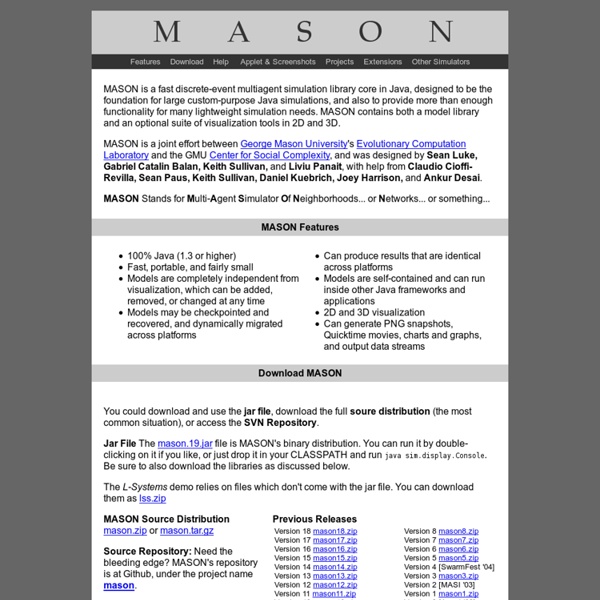NetLogo Home Page
NetLogo is a multi-agent programmable modeling environment. It is used by many hundreds of thousands of students, teachers, and researchers worldwide. It also powers HubNet participatory simulations. What can you do with NetLogo? Join mailing lists here. Download NetLogo Go to NetLogo Web NetLogo comes with a large library of sample models.
The Most Effective Factor in Education
CIAO! | Cooperation & Interoperability – Architecture & Ontology
Spurious Correlations
Home
Simplify your research! Plan your research project with the help of SAGE Research Methods. With SAGE Research Methods, faculty, students, and researchers can: Learn how to design a research project Discover new methods to use in your research with the Methods Map Read over 175,000 pages of SAGE's renowed research methods content from leading global authors Browse content from over 720 books, dictionaries, encyclopedias, and handbooks Share content with colleagues and research partners using Methods Lists Explore related online journal content with the SAGE Journals widget Watch a video that answers key questions about research methods Click here to recommend SAGE Research Methods to your library. Watch a video tutorial to learn more about how to use the tools on SAGE Research Methods in your research. Academic Researchers Find content related to your area of research to help you refine your research methods. Students Teachers and Lecturers Library Administrators About SAGE Video »
Memo: Memorandum on design-oriented information systems research
100 Search Engines For Academic Research
Bestseller All Video On Demand: Rent or Buy Clothing & Accessories Major Appliances Arts, Crafts & Sewing Automotive Baby & Nursery Beauty & Grooming Books & Textbooks Collectible Coins Camera & Photo Cell Phones & Accessories Classical Music Computers, Tablets & Components Blu-Ray & DVD Electronic Components & Home Audio Entertainment Collectibles Video Games Other Gift Card Brands Grocery & Gourmet Food Patio, Lawn & Garden Health & Household Business & Industrial Supplies Jewelry Kindle Store Kitchen & Dining Magazines Miscellaneous Digital Music CDs & Vinyl Musical Instruments Office & School Supplies Pet Food & Supplies Shoes, Handbags, Wallets, Sunglasses Software Sports Collectibles Sports & Fitness Home Improvement Toys & Games Watches by TeachThught Staff General Need to get started with a more broad search? ResearchGate Access over 135 million publication pages and stay up to date with what’s happening in most professional fields. RefSeek Digital Library of the Commons Repository Microsoft Academic Search Google Trends Jurn
IS Theory
The daily storyline of science
Mill's Methods
Methods of induction developed by John Stuart Mill Mill's Methods are five methods of induction described by philosopher John Stuart Mill in his 1843 book A System of Logic.[1][2] They are intended to establish a causal relationship between two or more groups of data, analyzing their respective differences and similarities. Direct method of agreement [edit] If two or more instances of the phenomenon under investigation have only one circumstance in common, the circumstance in which alone all the instances agree, is the cause (or effect) of the given phenomenon. For a property to be a necessary condition it must always be present if the effect is present. A B C D occur together with w x y z A E F G occur together with w t u v Therefore A is the cause, or the effect, of w. To further illustrate this concept, consider two structurally different countries. Method of difference This method is also known more generally as the most similar systems design within comparative politics. F G occur with y w
Basic Business Research Methods
Organizations use research, especially in market research activities. Market research is used to identify potential markets, the needs and wants of each, how those needs and wants can be met, how products and services could be packaged to be most accessible to customers and clients, the best pricing for those products and services, who the competitors are and how best to complete against each, potential collaborators and how to collaborate with each -- and many other applications of research. Organizations can conduct this research without having to have advanced skills. Sections of This Topic Include Planning Your ResearchSelecting Which Business Method to UseHow to Select From Among Public Data Collection ToolsMethod: Appreciative InquiryMethod: Case Study DesignMethod: Focus GroupsMethod: Interview DesignMethod: ListeningMethod: Questioning (face to face)Method: QuestionnairesMethod: SurveysAnalyzing, Interpreting and Reporting Results Also seeRelated Library Topics Recommended Books
Research Methods
Research methods is a broad term. While methods of data collection and data analysis represent the core of research methods, you have to address a range of additional elements within the scope of your research. The most important elements of research methodology expected to be covered in business dissertation at Bachelor’s, Master’s and PhD levels include research philosophy, research approach, methods of data collection, sampling and ethical considerations. Let’s look briefly at each of them separately. 1. Research philosophy is associated with clarification of assumption about the nature and the source of knowledge. Positivism and phenomenology are the two main contrasting research philosophies related to business studies. You can read more about research philosophy here. 2. Research approach can be divided into two, inductive and deductive categories. You can read more about research approach here. 3. Research design can be exploratory or conclusive. 4. 5. 6. John Dudovskiy



